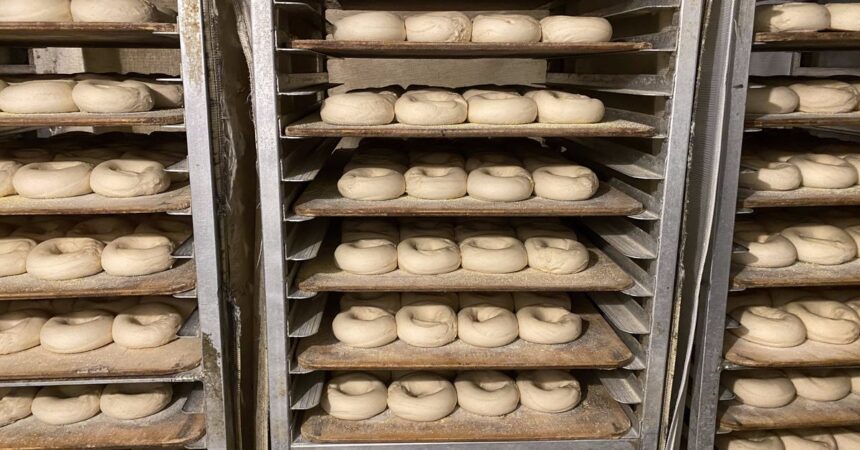Every morning from 5:30 a.m., a subtle waft of malty aroma greets customers when they pull up at Atlantic Bagel in Hingham. The whiff of allium-y seasoning alerts hungry customers they’re in the right spot for good bagels, no matter how sleepy they are. Customers start to mosey into the tiny, cash-only business at around 6:30 or 7 a.m., sometimes forming a line that pokes out the door. On weekends, owner Ed Brunoli says that he sells around 150 to 160 dozen bagels (1,800 to 1,920 in total) in a town of 23,000 residents, charging $2 each. There are 14 flavors in total, which are housed in wire baskets with each flavor labeled. The top sellers are plain, everything, and cinnamon raisin; the regulars know to get there early to fetch their desired flavors before the baskets become depleted.
So what makes these bagels so special that the locals refer to Atlantic Bagel as the bagel shop? Why have people who grew up in Hingham and neighboring communities in the South Shore patronized the tiny business for decades? Here, it’s all about balance: a slightly crusty exterior supported by dense yet soft innards with some chewiness to rise above its bread counterparts. More importantly, no toasting is required because it’s baked to such perfection that any additional heat may send it off balance.
Brunoli’s bagels are “certainly like a true New York-style bagel,” says a longtime customer who didn’t want to reveal his name. “They have a good crunch on the outside but soft on the inside,” says Kara Sullivan, a regular who grew up in Hingham. But it’s not just the bagels. Each of the 12 housemade cream cheeses has a fan following, too. Standouts include lox and jalapeño, according to another lifelong Atlantic Bagel supporter Dan Weaver.
Legend has it that original owner Jimmy McCormack brought the bagel recipe from Burlington, Vermont when he returned to Hingham and opened the shop in 1992. Since McCormack’s retirement and his handoff of the bagel shop to his longtime employee Ed Brunoli, the origin story of the recipe had been lost. However, 32 years later, the recipe “remains unchanged, exactly like how we did it in 1992,” Brunoli says with pride. However, he wouldn’t disclose any secret ingredient beyond “Hingham water.”
:no_upscale()/cdn.vox-cdn.com/uploads/chorus_asset/file/25460428/IMG_0848.jpg)
It’s not just the recipe. Taking a tour of the operation is like traveling back in time. Two giant button and dial-operated stand mixers, from the 80s, stand as tall as teenagers, meticulously kneading the dough; next to them is a long dough shaper, an early investment, which divides the kitchen in two.
Victor Villalobos, one of the head bakers, swiftly grabs and tosses a piece of pillowy dough into a little opening on one end; within seconds, a ring-shaped, bouncy bagel flies out on the other end.
Victor, along with his brother Rodolfo Villalobos, has worked at the shop for three decades. Originally from Guadalajara, Mexico, the brothers now call nearby Brockton their new home. While Victor mostly takes care of kneading and fermenting the dough in the basement of the bagel shop, his brother Rodolfo finishes the bagels in the oven upstairs.
:no_upscale()/cdn.vox-cdn.com/uploads/chorus_asset/file/25460444/IMG_0819.jpg)
Due to the large volume and their insistence on freshness, the Villalobos arrive at 3 a.m. to get the oven started. The last stretch of bagel making involves Rodolfo submerging the yeasted dough into a steaming kettle and then scooping the pillowy, shiny buns onto burlap-lined cedar boards to be covered with seasonings. Then, all bagels are finished in a Middleby Marshall conveyor oven, which, like almost everything else at Atlantic Bagel, “has been in use since the beginning,” Brunoli says.
At a time when bagels are growing larger and their flavors funkier and more boundary-pushing, Atlantic Bagel remains relevant, especially to residents of the South Shore, where a true New York-style bagel was once hard to come by. It’s also one of only a handful of Hingham mom-and-pop shops still standing, cultivating a decades-long relationship with its community. A second location in Cohasset opened a few years ago; Brunoli also delivers to some residents and businesses in Pembroke himself, heeding increasing demand. “I think it’s the familiar texture and flavor they’ve grown up with,” Brunoli says. “It’s the only bagel as they know it.”
When bumping into a group of teens in student-athlete apparel and Crocs munching on their egg and cheese sandwiches on a bench outside the bagel shop, I asked them what makes Brunoli’s bagels so special. One emerged from behind the sandwich she was holding and exclaimed with enthusiasm, “It’s the nostalgia!”











